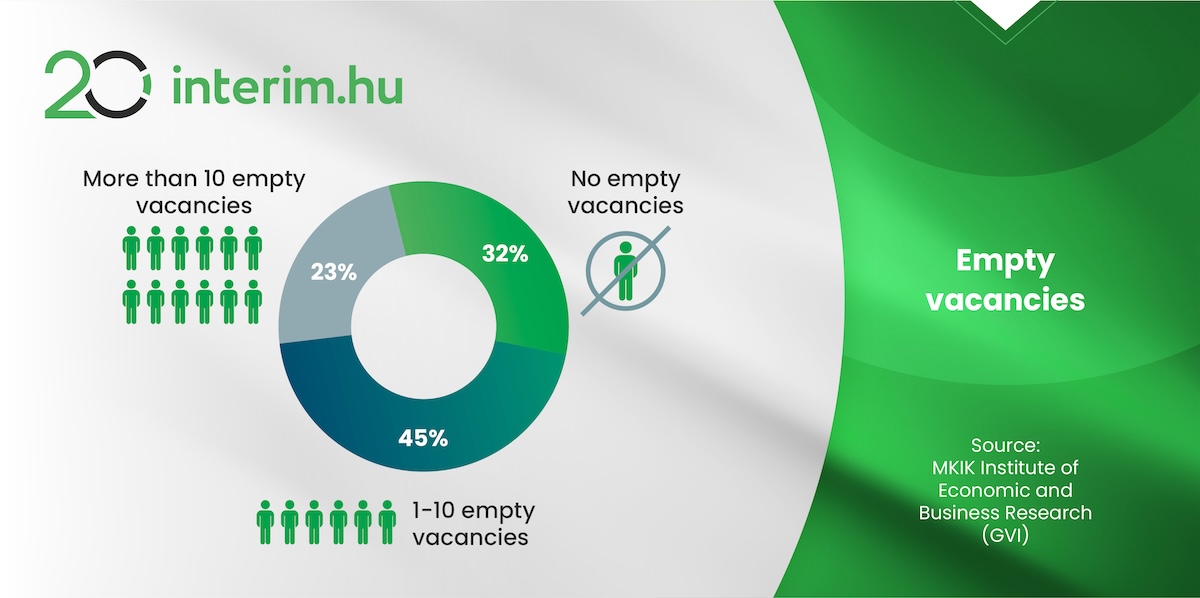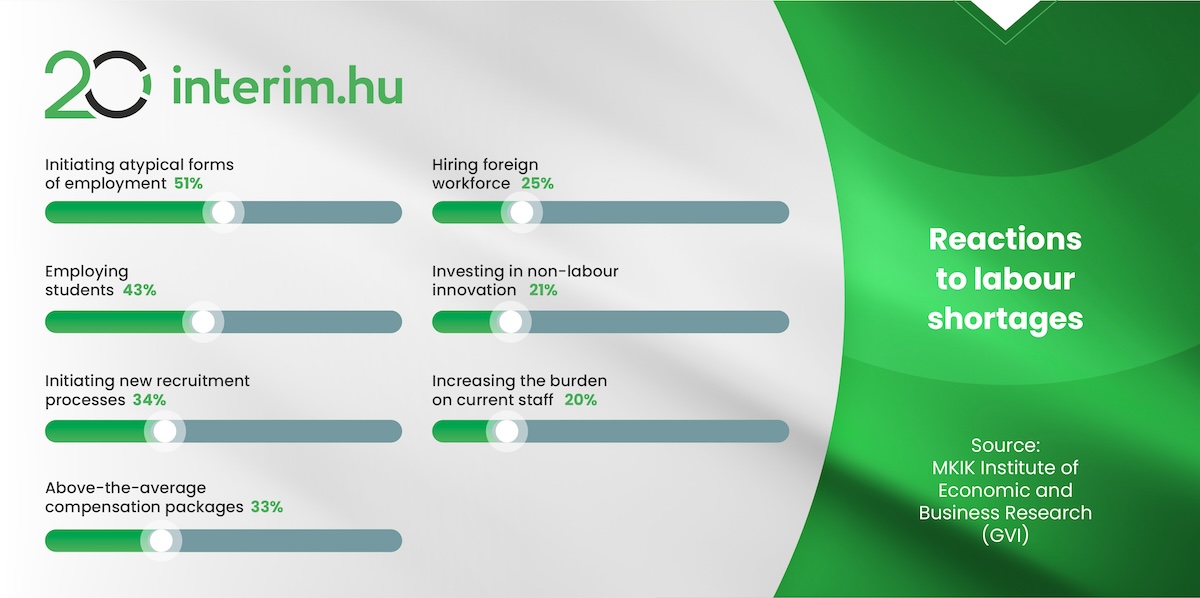Shortage in various occupations: from purchasing agents to doctors, we need professionals! We will take a look at what can be considered shortages in Hungary today, and give an example of what can solve this pressing problem through the situation.

Shortage in various occupations: from purchasing agents to doctors, we need professionals!
The MKIK Institute of Economic and Business Research (GVI) published a survey in 2022, asking 350 companies with at least 20 employees how they perceive labour shortages. The survey found that 69% of firms can report difficulties that have their roots in labour shortages. The services sector (75%), construction (71%) and manufacturing (69%) were the most likely to perceive disruptions. In this blog post, we will take a look at what can be considered shortages in Hungary today, and give an example of what can solve this pressing problem through the situation of purchasing agents!
Labour shortages are a persistent problem
The labour market is constantly changing, adapting to the environment and economic needs, which can create gaps that cannot be filled due to a lack of capacity. The recession has not yet significantly increased unemployment, the labour market as a whole is very tight, and there is simply not enough capacity available. In practice, this means that firms cannot find people for some positions for weeks or months. This in turn can jeopardise your business.
The survey referred to in the introduction clearly shows that almost 70% of firms are facing labour shortages. The trend in vacancies confirms this: only 32% of companies had all their vacancies filled, so only a third were not looking for new staff, 45% had between 1 and 10 vacancies and 23% were looking for more than 10.

There are various efforts to tackle the problem of labour shortages. Most often, particularly for blue-collar workers, foreign economic migrants are used to fill vacancies for which there are no domestic workers available. The government has also recognised that there is no longer a reserve in the labour market in certain areas, and has therefore, for example, extended the range of countries from which workers can be imported on easier terms. Examples include Indonesia, Kazakhstan, Mongolia, Vietnam, Brazil, Kyrgyzstan, Colombia and Venezuela.
The GVI survey found that the companies surveyed are responding to the difficult situation by introducing atypical forms of employment (e.g. part-time, teleworking) in most cases (51%), some are recruiting student workers (43%), some are introducing new recruitment methods (34%) and some are trying to outperform competitors on wages.

High turnover and labour shortages can easily lead to companies not finding new people to replace those who leave. In some sectors and positions, this may be more frequent. These are known as shortage occupations.
Let's find out what are now considered shortage occupations in Hungary.

Shortage of Occupations in Hungary
The shortage of occupations in Hungary is very varied, including skilled, intermediate and graduate occupations. It is worth noting that labour shortages are an international problem, for example, the shortage of IT specialists is a burning issue throughout the EU, but there are also challenges in the USA, where there is a huge shortage of truck drivers, for example.
In this blog post, we focus on the situation in Hungary: let's look at the shortages by industry.
Healthcare professions
In the health sector, demand for doctors, nurses and pharmacists remains high. Health professionals play an important role in keeping society healthy, but filling vacancies is becoming more and more difficult.
IT sector
In the IT sector, programmers, system administrators, information security specialists and software developers remain in high demand. IT professions offer high wages and stable employment opportunities. Thanks to the digitalisation boom, there is now a need for IT professionals in every field. As modern technologies, such as robotics and artificial intelligence, become more and more embedded in companies, the demand for IT professionals will grow even more.
Construction
In the construction sector, the most sought-after occupations are skilled workers, masons and foremen. Growth in the property market and housing construction are contributing to this demand. The expansion of the construction industry in recent years and the increased number of projects have meant that there are now fewer skilled workers than there should be. It should be noted here that this area is particularly affected by emigration. In many cases, skilled workers can find a job abroad even with a minimum knowledge of the language and can even enjoy competitive benefits compared with their counterparts abroad.
Engineering professions
In the engineering field, mechanical, electrical and civil engineers are in high demand. They are essential for industrial and technological development. The labour market (e.g. in manufacturing, production, construction) is in great demand for professional engineers with experience!
Hospitality
The hospitality sector is experiencing a growing shortage of cooks, waiters and hotel staff. The tourism and hospitality sector has been hit by the COVID-19 epidemic. The closures have led to restaurant closures, with many chefs, kitchen staff and waiters being made redundant, but the same trend has also affected the hotel industry. People who lost their jobs looked for new ones, and once life got going again, they did not return to the hospitality industry.
Renewable energy
Demand for electricians and energy efficiency specialists is growing in the field of energy efficiency and renewable energy. Interest in ecological sustainability is growing, but it is becoming increasingly difficult to find free-capacity professionals with expertise in these topics.
Example: is procurement as a niche occupation?
One of the critical shortage occupations is the position of purchasing agent. In conceptual terms, a procurement agent is a person who ensures the availability of goods, raw materials and resources needed for production, trade and service provision that the firm cannot produce from its capacity.
Procurement processes include market research, selection of potential suppliers, negotiation of prices and terms, conclusion of procurement contracts, and review of supplier performance and quality. The procurement system is the set of methods and procedures used by a company or organisation.

In all cases, purchasers must develop a strategy that sets out how they will procure and with which suppliers they will work. They may be direct or indirect purchasers, depending on the products or services they are procuring, or they may be categorised according to the purpose of the procurement. In the course of the activity, professionals will take into account the need to provide the resources required by the organisation, while at the same time ensuring cost reduction and quality. In addition, purchasers work closely with suppliers and enter into contracts with them to ensure a smooth flow of supply and production.
The role of the purchaser, the procurement process, is therefore a complex one, requiring complex knowledge, experience and relationships, not to mention the significant impact on costs and quality.
In our experience, there is a huge gap in the areas of procurement, warehousing and logistics. In our daily work, we are more and more often contacted in connection with one of these shortage occupations. For example, in the last period, we have received several requests where the company was in a difficult situation due to a lack of a purchasing colleague. Let's take a look at what Interim Ltd. offers in such situations!
The solution: the interim procurer
Procurement is therefore a shortage occupation, which means that vacant positions are quite difficult to fill. If, for example, a purchasing manager resigns, is made redundant by the company, or a new purchasing manager position simply arises in a new division, the aim is to find quality staff to fill the vacancy as soon as possible to ensure that there are no disruptions to operations.
In the case of management positions, a successor is typically found through a headhunt, at least if the position is not filled by promotion from within. However, the duration of a headhunt is unpredictable. One reason for this is that people in senior positions are not usually job seekers, they are working somewhere, which means that an attractive offer has to be put together that beats the current job. Even if you do succeed in attracting the right person, you have to expect a notice period of up to six months in many cases. It is therefore a long process, during which time work can be disrupted, not to mention the internal conflicts that can arise from working without a manager.
Hiring an interim manager for procurement can be a good decision for several reasons. An interim specialist is an experienced professional who works temporarily for a company or organisation to help with specific tasks or projects. The interim manager is not an employee, does not compete with his or her colleagues, and has his or her eye on achieving the goals set. Not to mention that they can be up and running in a short time, even 1 week, so the workflow is not interrupted and the team is not left without a leader even for a short period.
By appointing an interim manager, there is enough time for the company to find the right person to grow the business in the long term.
Interim Ltd. has been playing a significant role in innovative management recruitment for two decades! Find out how we work!